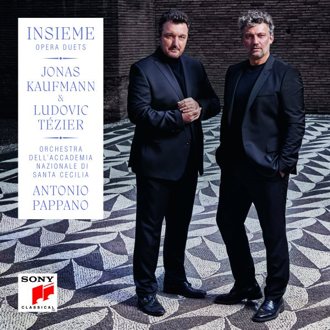|
|
|
|
|
|
|
|
|
The Classic Review, October 18, 2022 |
| David A. McConnell |
|
Insieme – Jonas Kaufmann, Ludovic Tézier
|
|
 I
came to this recording with high expectations, having written positive
reviews for Ludovic Tézier’s first solo album (May 2021) and the
Kaufmann/Pappano performance of Verdi’s Otello (June 2020). In these
recordings the theatrical characterization and keen intelligence of both
singers is consistently impressive, qualities that are readily apparent
right through this distinguished collaboration. I
came to this recording with high expectations, having written positive
reviews for Ludovic Tézier’s first solo album (May 2021) and the
Kaufmann/Pappano performance of Verdi’s Otello (June 2020). In these
recordings the theatrical characterization and keen intelligence of both
singers is consistently impressive, qualities that are readily apparent
right through this distinguished collaboration.
The recital opens
with “In un coupé?” from La Bohčme. Pappano’s excellent orchestra sets the
scene, accompanying singing that is both resplendent and enthralling. Both
singers have commanding technique and a richly upholstered, honey toned
lyricism. Their performance fully captures the forlorn sadness of failed
love, though their sound is perhaps a bit more mature to suggest the
youthful innocence of these characters. “Enzo Grimaldo, Principe di
Santafior, che pensi?” from Ponchielli’s La Gioconda follows, Tézier making
Barnaba’s manipulative mind games tangible.
The remainder of the
program features selections from Verdi operas. Two duets from “Les Vępres
siciliennes,” heard here in the original French, show a composer that
embraces a bolder color palette and an almost verismo style of text setting.
Kaufmann and Tézier fully become their characters – in the Act III duet
where Montfort reveals that he is Henri’s father, the psychological tension
is genuine. Likewise, the sense of friendship in “Le voila! C’est l’infant!”
from Don Carlos. I was keen to hear the “Era la note” duet from Otello: in
my review of the entire opera, I suggested that Kaufmann’s portrayal had
grown deeper compared to his 2018 Covent Garden DVD recording. Yet here
Kaufmann is, if anything, even more heart wrenching, as Tézier’s Iago
convinces Otello of Desdemona’s infidelity, laying the groundwork for the
work’s tragic end.
The liner notes being with a brief discussion
between the two singers in which their mutual admiration and enjoyment is
unmistakable, as it is in this recital. An excellent discussion of the music
by Bjřrn Woll follows, but texts and translations are not provided. I must,
once again, remind record companies just how frustrating this is – with such
communicative artists in such compelling performances, the listener should
have text and translation at hand. While I own recordings of the Puccini and
Verdi, I do not have any of the Ponchielli, and I spent over 15 minutes
searching the internet for a translation. Is the expectation that all opera
lovers speak fluent Italian? Or must opera lovers have books of translations
at the ready? What if a person new to opera hears a track from this
recording on the radio, or online, and then purchases the entire album – why
make it a chore for them to understand the texts? Surely, at the very least,
a link to translations could be provided.
Sony’s engineering
presents a wide-ranging, cinematic sound that more than once reminded me of
Decca’s glamorous Karajan opera recordings. While one might suggest that the
at times “larger than life” sound does not serve the more intimate moments
as well (admittedly, there are few such moments in this recital), there is
no denying the sheer weight and tonal splendor of the music making. Rarely
has this orchestra sounded so refulgent. Pappano’s opera expertise ensures
every track is unerringly paced and has maximum dramatic impact.
This is an operatic recording that clearly exhibits a love and emotional
involvement with the music. The chemistry between these two singers and this
excellent orchestra makes this a particularly noteworthy album.
|
|
|
|
|
|
|
|
|
|
|
|
|